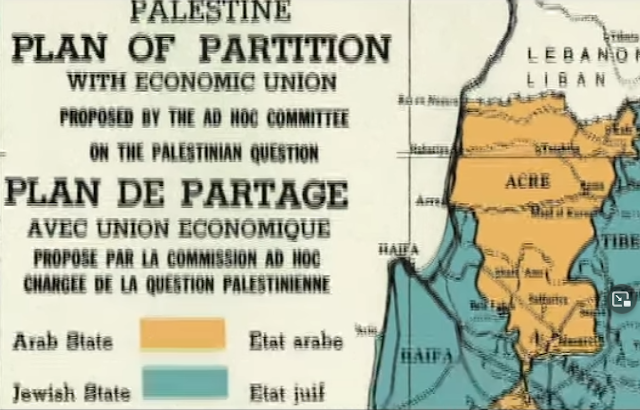On the 29th of November 1947, the UN General Assembly voted on Resolution 181, adopting a plan (the United Nations' 1947 Partition Plan for Palestine) to partition the British Mandate into two states, one Jewish, one Arab. Israel's Foreign Affairs Agency characterizes it's significance :
UN General Assembly Resolution 181 remains relevant even today for three key reasons: Resolution 181 confirmed the 1922 recognition by the international community that the Jewish people deserve their own state, a Jewish state, in their historical homeland. The resolution called for the establishment of two states for two peoples - Jewish and Arab - between the Mediterranean and the Jordan River, each fulfilling the national aspirations of its respective populations. That formula remains Israel's position with regards to peace negotiations.
Then as now, a Palestinian state can only be established through compromise and mutual recognition. The refusal by the Arab population of the mandate territory to accept Resolution 181 demonstrated that they were not interested in establishing their own state if it meant allowing the existence of a Jewish state. This opposition to acknowledging the right of a Jewish state to exist still lies at the core of the conflict.
 |
| The U.N. partitioned Palestine into territories for a Jewish and a Muslim state |
Recently in Los Angeles, Steven Geiger's "Mensch Foundation" reprised their 2017 commemoration of the Partition plan at their annual Mensch Awards. This year's live panel discussion was introduced by an informative, 9-minute documentary, "The Story of a Vote: November 29, 1947" by Israel-based history chroniclers, Eric Weisberg and Pereg Levy of Toldot Yisrael. Their advisor, Dr. Michael Berenbaum, participated in the panel discussion regarding the issue - along with fellow scholars, Israeli-American Prof. Judea Pearl of U.C.L.A., and Rabbi Abraham Cooper, assistant dean of the Simon Wiesenthal Center. The discussion, viewable here (edited by Jewish Life TV), was moderated by Stanley Goldman, a professor at Loyola Law School.
Dr. Judea Pearl, UCLA Emeritus Professor of Artificial Intelligence opines in this exclusive video interview at the event to JooTube's questions:
What did it mean when the U.N. ratified their Partition Plan for Palestine on Nov 29, 1947 -- and what does it say, which contradicts Palestinian allegations that Israel was established on upon sovereign Palestinian Arab state?
Why haven't Palestinian politicians accepted Israel's offers for developing an independent sovereign, and stop pilfering payments of international aid?
How can the EU, U.N., and America advocate for an Israeli-ceded, Palestinian state - before the Islamist politicians permanently stop inciting Jew-hatred and reconquering Jews' sovereignty in Israel? Click for answers here:
In "The Most Legitimate State on Earth" (Tablet Magazine, Nov 28th, '21) writer Liel Leibovitz asks and answers:
